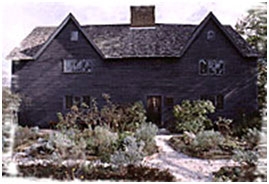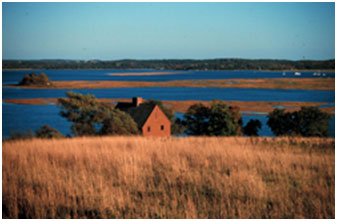 Ipswich, MA is a beautiful riverfront and seaside town on Boston’s North Shore known far and wide for its significant number of first period structures, pristine beaches and quaint shopping. The town’s residents have been actors and witnesses to much change in American culture and history from first contacts between Europeans and Native Americans to the immigration, deindustrialization and emergent tourism of the twentieth and twenty first centuries. In fact, the town carries so much history within its boundaries that one of its 18th century structures has taken up permanent residence at the Smithsonian Museum of American History as an interactive exhibit showcasing the everyday lives and struggles of generations of Ipswich residents as a window into the social history of a nation.
Ipswich, MA is a beautiful riverfront and seaside town on Boston’s North Shore known far and wide for its significant number of first period structures, pristine beaches and quaint shopping. The town’s residents have been actors and witnesses to much change in American culture and history from first contacts between Europeans and Native Americans to the immigration, deindustrialization and emergent tourism of the twentieth and twenty first centuries. In fact, the town carries so much history within its boundaries that one of its 18th century structures has taken up permanent residence at the Smithsonian Museum of American History as an interactive exhibit showcasing the everyday lives and struggles of generations of Ipswich residents as a window into the social history of a nation.
But, like many New England towns in the 21st century—and in our current sluggish economy – Ipswich cannot rest on its past successes or models for economic and social sustainability. In order to map and create a vibrant future the town recently began a process to define a community vision, understand the current economic development situation, and imagine ways to brand and sustain the town for generations to come. The questions and concerns of Ipswich leaders include: How can Ipswich attract businesses and residents and leverage the past and the city’s legacy for the present and the future? How can quality of life be improved and what will Ipswich be known for in the next 100 years? How can the city engage all residents in civic activities and encourage them to “own” the town and its future? Though these are fairly standard questions in the world of planning and development, from where I sit, a key part of answering them and charting next steps requires a decidedly non-economic approach.
Enter the humanities.
I (and the humanities) have joined the Ipswich effort by way of my work with the Center for Economic Development and Sustainability (CEDS) at Salem State University, an interdisciplinary research group working with regional partners on a wide range of economic development projects. Our work in Ipswich is to help leaders understand their “community” assets and identify and prioritize strategies to begin what will be a town-based deliberative planning process. This is a multi-pronged approach. To address natural resources and zoning concerns one colleague is employing GIS technology to map the town’s geographical and geological resources while another is employing statistical metrics to gather data on travel, tourism and the creative/cultural economy. Into this mix I am bringing a cultural studies query about the nature and meaning of “community” itself. [Note to all readers: I could talk/write about this topic forever…I’m going to try and make it brief…]
Far from being a fixed entity, the concept of “community” has and continues to be constructed and defined in numerous ways over time and place. As I tell my students, “community” is a rare word: although used in hundreds of different ways, it always carries a positive connotation! While “community” may have a geographic referent (that is, it may be understood as a town or neighborhood or block) it can also refer to affinity groups, relatives, religious sects, race or ethnic-based groupings or gender…to name a few. Many scholars have developed models for describing and identifying community. I embrace them all: Robert Putnam’s concept of social capital, Benedict Anderson’s ideas of imagined communities, Robert Bella’s notion of communities of memory and Alexis deTocqueville’s volunteerism all share space on my bookshelves and in my brain. Ultimately, vis-a-vis town-based projects like Ipswich, I ascribe to the belief put forth by Thomas Bender, who, in synthesizing a century of community theory has suggested that while there is often a geographical referent to community, it is also defined by a set of/type reciprocal relationships that have emotional as well as spatial components. Rounding out my approach is a nod to network theory (used in the fields of cultural anthropology and cultural geography) which leaves open the possibility of finding community wherever it might exist and seeks to note/understand the ways in which cultural productions and cultural experiences of all sorts define and reflect understandings and experiences of community.
These are the ideas that are driving my approach in Ipswich. Without assuming any given definition of community but acknowledging a geographic referent as a starting point (after all, this is a town initiative!), my students and I have begun speaking with residents from many walks of life in coffee shops, places of business, and on the telephone. We are asking them questions in three broad areas:
1) When people say or hear “the Ipswich Community” what does the phrase mean to them this and what comes to mind (people, places, groups)?
2) What shapes, supports or builds “The Ipswich Community” and what are the barriers to the same?
3) Are there groups of people who are more or less connected to/part of “The Ipswich Community”?
The project is ongoing but exciting! Preliminary findings suggest that there are competing, divergent, and multiple answers to all of these questions within one small city. Every scholarly definition listed above has been recorded and respondents offered a range of answers to questions about those places and people and events that create a sense of community as well as a diverse set of ideas about barriers to the same. No one was indifferent, many people offered more than one example or definition of “community,” and everyone has had something to say about what the term means to them and in their town. At its most basic level, the project underscores that the scholarship of community theory that has been flourishing for the past twenty years is still relevant and that there is still more to say.
But what does this have to do with economic development, branding, or other activities often in the purview of town hall or business leaders? Simple: Most towns and cities engage in planning assuming or having to work within a definition of community that is synonymous with the geopolitical boundaries of the town or city itself. However, geography is not the only (or even primary) way that people think, talk about or experience “community”. Thus, in Ipswich and elsewhere, if a key part of any successful “community” re-visioning requires meeting felt needs, producing an engaged citizenry, and getting “buy-in” from the widest possible set of stakeholders, it is critical to understand residents’ ideas about two things:
town hall or business leaders? Simple: Most towns and cities engage in planning assuming or having to work within a definition of community that is synonymous with the geopolitical boundaries of the town or city itself. However, geography is not the only (or even primary) way that people think, talk about or experience “community”. Thus, in Ipswich and elsewhere, if a key part of any successful “community” re-visioning requires meeting felt needs, producing an engaged citizenry, and getting “buy-in” from the widest possible set of stakeholders, it is critical to understand residents’ ideas about two things:
1) What they think about when they talk about (or hear someone else talk about) “community? and
2) What defines, builds, sustains or limits a sense and experience of “community” in the location under study?
Not only might this dialogue help define terms and help leaders understand the various ways that “community” language is being used by residents, but, ultimately, understanding and being able to identify existing networks of relationships, bonds of affection and places/institutions that currently foster (or hinder) the same can help a town prioritize projects so as to leverage what already works and avoid pitfalls. It would behoove all of us hoping to sustain and transform our towns and cities to note, celebrate, expand, and make use of all the places and forms in which “community” is already found. These existing networks will be our most valuable assets when facing the often daunting task of imaging and creating a transformed future.
Everyone knows that funding is be hard to come by these days, but if Ipswich is any indication, there is no scarcity of social bonds or networks of mutuality and affection in American towns and cities. In short, there is no scarcity of “community”—although not always in the ways or places or forms that are best known to civic or business leaders. In this era of limited capital resources, ”community” economic development and planning projects would do well to follow Ipswich’s lead and be open to interrogating the meaning and nature of “community” itself.


